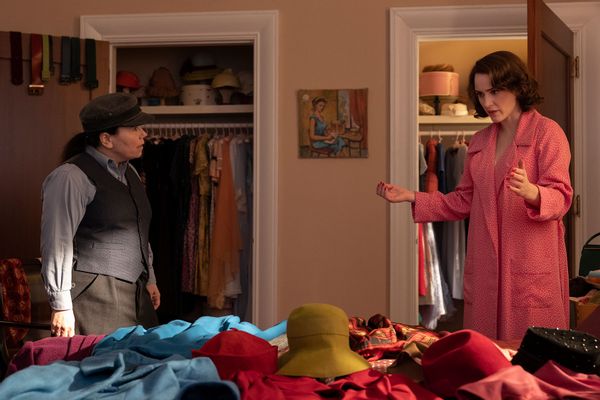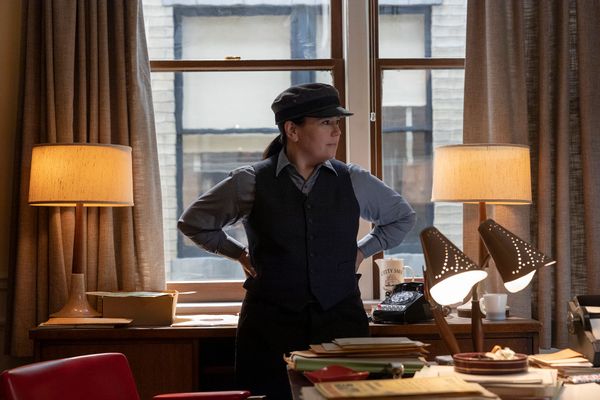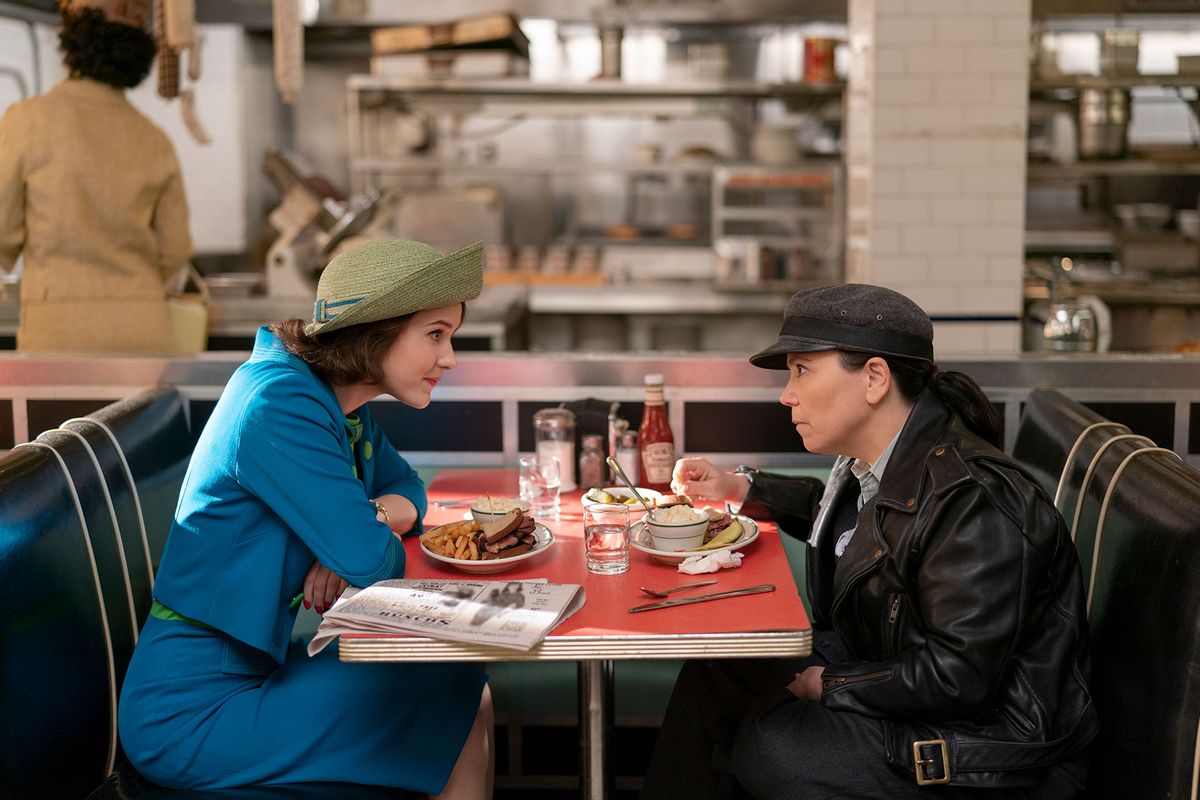Managers have to deal with a lot. Temperamental stars, sometimes more trouble the more fame they receive. Sneaky contracts, producers and directors who won't call you back. Throw in the pressures of sexism, homophobia and insults received for being diminutive, frequently mistaken for a little boy, and you have Susie (Alexis Borstein), the former Gaslight Café employee turned manager for "The Marvelous Mrs. Maisel."
What's the cause of the fight? It doesn't pass the Bechdel test. It's over a man.
Midge (Rachel Brosnahan) credits Susie with turning her "nervous breakdown" into a comedy career. Susie saw something in Midge from the moment she wandered drunkenly, heartbroken and half-dressed, onto the stage at the Greenwich Village nightclub. It took time to convince Midge comedy was her destiny, that Susie could be the one to get the comedian to stardom and for the rest of the world to sit up and pay attention. That striving was at the center of the series, which wraps up this season.
But given less fanfare is Susie's journey. Her career trajectory occupies the bulk of the episode "The Testi-Roastial," flashbacks sandwiched in between a roast of the older Susie, who has turned into a kind of pot-addled Patti Smith in her later years. That transformation seems a bit unlikely for the butch-presenting character, but the show has never been great (or clear) about Susie's identity. What it has done, and what has and continues to be a joy to watch, is move Susie from a self-deprecating presence barely scraping by to a bold and successful person, helped along by the most unlikely of motivators, Midge Maisel. Susie made Midge a star, but Midge made Susie brave.
One of the big plot knots this final season of the Prime Video show is how Midge and Susie, the closest of collaborators and the unlikeliest of friends, grow apart. They stop speaking for years, after a rift develops between them. What's the cause of the fight? It doesn't pass the Bechdel test, folks. It's over a man. Hot and cold ex-husband Joel takes the fall for Midge, after shady financial dealings, but really, he takes the fall for Susie. At least, Midge sees it that way.
Susie has never been good with money. She gambles. She makes bad deals. She trusts the wrong people. Having had a lifetime of experiences of poverty, this makes sense. She wouldn't know what to do with money; she's never had it. She puts her faith in shady people because that's who she knows. She makes decisions based out of fear, which is not the best way to think long-term. In survival mode, Susie has not been able to have a long-term before, even to consider it.
 Alex Borstein (Susie Myerson) and Rachel Brosnahan (Miriam 'Midge' Maisel) in "The Marvelous Mrs. Maisel" (Philippe Antonello/Prime Video)
Alex Borstein (Susie Myerson) and Rachel Brosnahan (Miriam 'Midge' Maisel) in "The Marvelous Mrs. Maisel" (Philippe Antonello/Prime Video)
Why can't it work out? she frequently demands of Susie with the bafflement of one for whom it always has.
As a wealthy housewife who went to Bryn Mawr (and we're presuming not on scholarship), Midge has not had to make decisions about money . . . at all. The Mary Sue describes her as "a character who is incapable of growing up unless reality is directly in her face — and even then, we'll have to see." For the bulk of her life until her divorce, money was just handed to her. Her struggle to get a job, keep a job and figure out her finances (as well as support to her parents, at times) is the polar opposite of Susie: Midge is not good with money because she's always had it. She expects it.
This expectation bleeds into all other areas of Midge's life. Of course you'll listen to her. Of course she's funny. Of course she'll be a success. And of course she's right. Why? Because she's Midge Maisel, pay attention! At times, this can make the show feel low stakes (and like a poster advertising privilege). Whatever ridiculous thing Midge does — from her refusal to ever be an opening act again to her multiple arrests — she'll get out of it, like a white feminist Houdini.
 Alex Borstein (Susie Myerson) in "The Marvelous Mrs. Maisel" (Philippe Antonello/Prime Video)But for Susie, it's the opposite. She has to fight to be heard. Partly she fights for Midge, to get her client to be taken seriously in a world of men, and partly she wages war because Midge has taught her to fight for herself. Midge has led by example in that regard. Why can't it work out? she frequently demands of Susie with the bafflement of one for whom it always has.
Alex Borstein (Susie Myerson) in "The Marvelous Mrs. Maisel" (Philippe Antonello/Prime Video)But for Susie, it's the opposite. She has to fight to be heard. Partly she fights for Midge, to get her client to be taken seriously in a world of men, and partly she wages war because Midge has taught her to fight for herself. Midge has led by example in that regard. Why can't it work out? she frequently demands of Susie with the bafflement of one for whom it always has.
Susie has also grown enough to grow away from Midge.
This persistence has helped Susie out of her comfort zone. Would the Susie of five seasons ago have followed a Hollywood producer into a gay bathhouse to demand an answer from him? Or, pretended to be a plumber — and fit in seamlessly, attracting a huge devotion of friends who cared for her and worried about her — in order to blend in at a Catskills resort? Midge has inspired Susie to take risks. Susie has also grown enough to grow away from Midge, which is healthy for a working and friend relationship an older Midge describes as lasting "longer than any of my marriages, combined." Susie has other clients. Some of them famous or about to be. She works just as hard for them as she does for Midge. She's learning to prioritize herself, which is something the Susie of before-Midge times perhaps could not have done.
Want a daily wrap-up of all the news and commentary Salon has to offer? Subscribe to our morning newsletter, Crash Course.
Midge doesn't take no for an answer. Likely because no one has really ever said no to her (which is why she deals with those rare conflicts when people call her out on her entitlement, as with closeted singer Shy Baldwin, so poorly and defensively). Midge holds grudges for life. But she also walks into every room with her perfectly coifed head held high.
And she taught Susie how to.

Shares